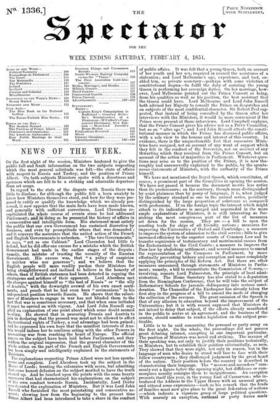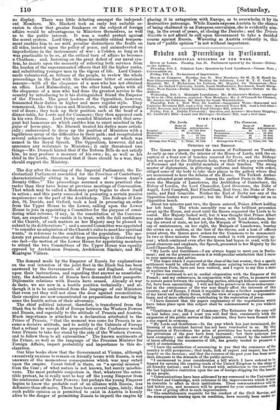NEWS OF THE WEEK.
ON the first night of the session, Ministers hastened to-give the public full and frank information on the two: subjects respecting which the most general solicitude was felt--the state of affairs with respect to Russia and Turkey, and the position of Prince Albert. On both subjects Ministers spoke with a directness and openness which are felt to be a striking and admirable departure from set usage. In o. to the state of the dispute with Russia there was little to disclose; for although the public felt a keen anxiety to know how Ministers themselves stood, and how far they were pre- pared to ratify or qualify, the knowledge which we already pos- sessed, it now appears that the main facts have been made known, and generally with sufficient correctness. Lord Clarendon re- capitulated the whole course of events since he last addressed Parliantenti_atid in-doing so he presented the history of affairs in a conseentive ahd intelligible form. His statement Must satisfy the public that oar own Government has sustained discretion by firmness, and even 'by promptitude where that was demanded ; and it couVeYs the assurance that the united action of the French and English Governments is unbroken. "The two Governments," he says, "act as one Cabinet." Lord Clarendon had little to defend, but he did offer one exeuse for a mistake which the British Government had made in the• earlier stages of the dispute ; namely, the mistake of trusting the veracity of the Russian Government. His excuse was, that " a policy of suspicion is neither wise nor generous"; and we believe that the English people will more readily pardon their Ministers for being straightforward and inclined to believe in the honesty of others, than if British statesmen had been detected in copying the stratagems and artifices of their opponent. Lord Aberdeen met the charges against himself as "the tool of Russia" or "the ally of Austria," with the downright avowal of his own exact senti- ments, and proofs that he had even been " acrimonious " in his independent position towards Russia. He shows that the reluct- ance of Ministers to engage in war has not blinded them to the fact that war is sometimes necessary, and that when once initiated it must be carried on with vigour. And Lord John Russell sup- plied an explanation of one point about which some doubt seemed to ding. He showed that in procuring Prussia and Austria to join in declaring that the present war must not be allowed to affect the territorial rights of Turkey, a real advantage had been gained ; and he expressed his own hope that the manifest interests of Aus- tria would induce her to continue acting with the other Powers in Preventing war from reaching the heart of Europe. The official Papers on the subject have been laid before Parliament, and they confirm the original impression, that the general character of the Thole action on the part of the French and English Governments has been simply-and intelligently explained in the statements of Alinisters.
The explanations respecting Prince Albert were not less sponta- neous and complete. Lord Aberdeen took up the subject in the }louse of Lords ; treating the calumnies with scorn, but admitting that some honest delusion on the subject merited to have the truth cleared up. And-he touched upon the points with the same hearty llareserve that had characterized his explanations on the subject of his own conduct towards Russia. Incidentally, Lord Derby corroborated the explanation of Ministers. But it was Lord John Russell who furnished the most painstaking and consecutive ac- %tint; showing how from the beginning to the present time Nage Albert had been introduced to take a share in the conduct
of public affairs. It was felt that a young Queen, both on account of her youth and her sex, required in council the assistance of a statesman ; and Lord Melbourne's age, experience, and tact, en- abled him, as private secretary—perhaps with some violation of constitutional dogma—to fulfil the duty of assisting the young Queen in performing her sovereign duties. On her marriage, how- ever, Lord Melbourne pointed out the Prince Consort as being, from his qualities as well as his position, the best assistant that the Queen could have. Lord Melbourne and Lord John Russell both advised her Majesty to consult the Prince on despatches and on subjects of the most confidential character. Sir Robert Peel sug- gested, that instead of being consulted by the Queen after her interviews with the Ministers, it would be more convenient if the Prince were present at those interviews. Lord Campbell explains, that the Prince Consort gives his advice not as a Privy Councillor, but as an " alter ego "; and Lord John Russell attests the consti- tutional manner in which the Prince has discussed public affairs, with a sole view to the honour and interest of this country. In evidence, there is the unquestionable fact that successive Minis- tries have resigned, not on account of any want of support which they felt in the conduct of the Sovereign, not on account of any thwarting which they received from the Prince Consort, but on account of the action of majorities in Parliament. Whatever ques- tions may arise as to the position of the Prince, it is now tho- roughly and unreservedly explained to the public, by the sponta- neous statements of Ministers, with the authority of the Prince himself.
We have not mentioned the Royal Speech, which constitutes, of course, a prominent part of the formalities in opening the session. We have not passed it because the document merits less notice than its predecessors ; on the contrary, though more distinguished by quiet plainness than by pomp of language, it is, when judged by the ordinary standard as one in the annual series, peculiarly distinguished by the large proportion of substance as ,cornpared. with professions. If on the foreign topic the interest which might attach to its indications is merged and superseded in the more ample explanatiOns of Ministers, it is still interesting as far- nishing the most conspicuous part of the list of measures set down for the session. They are -- a bill to open the coasting trade for ships of all friendly nations ; measures for improving the Universities of Oxford and Cambridge ; a measure to improve the system of admission to the civil service; bills to give increased efficiency to the superior courts of Common Law and to transfer cognizance of testamentary and matrimonial causes from the Ecclesiastical to the Civil Courts ; a measure to improve the Poor-law by abolishing settlement ; and several measures to amend the representation of the Commons in Parliament, by more effectually preventing bribery and corruption and more completely applying the principles of the Reform Act. But there are other measures announced through statements of Ministers in Parlia- ment; namely, a bill to reconstitute the Commission of Sewers,— involving, repeats Lord Palmerston, the principle of local admi- nistration. The Home Secretary has also stated to a deputation from the Birmingham Conference, that he will take the subject of Reformatory Schools for juvenile delinquency into serious consi- deration. The Chancellor of the Exchequer has already taken the first step in the progress of a bill to amend the mode of charging the collection of the revenue. The great omission of the Speech is that of any allusion to education beyond the improvement of the Universities; but it is with reason supposed that Ministers do not intend to delay that subject, if the efforts already manifested in the public to arrive at an agreement, and the business of the session, should combine to render legislation on the subject prac- ticable.
Little is to be said concerning the personal or party array on the first night. On the whole, the proceedings did not possess great debating interest, excepting in one important particular. The position of Ministers was novel and striking. The manner of their speaking was, not only to justify their positions technically, as Ministers, but to establish their position substantially, as men. They showed that they were right, not only in reason, but in the language of men who desire to stand well face to face with their fellow countrymen ; they challenged judgment by the great heart of the nation. Their position before the country is described in characterizing their language. The "movers and seconders" com- monly cut a figure before the opening night, but diffidence or com- monplace usually consigns them to insignificance. An exception presents itself this year, in the young Earl of Carnarvon ; who in- troduced the Address to the Upper House with an unusual grace, and uttered some expressions—such as his remark that the feuds of families must now give place to the great federation of nations —which indicate a vigorous grasp of large political questions. With scarcely an exception, sectional or party forces made no display. There was little debating amongst the independ- ent Members. Mr. Blackett took an early but suitable oc- casion to show that greater frankness on the subject of foreign affairs would be advantageous to Ministers themselves, as well as to the public interest. It was a useful protest against the seoret system. Lord Grey, whose invincibly critical tempera- ment enables him to see with peculiar distinctness the faults on all sides, insisted upon the policy of peace, and animadverted on imperfections in the instruments of war : a Cobden as long as it was practicable to be so„ at the critical turn of affairs he becomes a Chatham ; and, fastening on the great defect of our naval sys- tem, he insists upon the necessity of relieving both services from the burden of the superannuated officers that fill the higher ranks, and substituting younger men in the vigour of life. Lord Clanri- oarde volunteered, as tribune of the people, to review the whole proceedings in the East with the wholesome bitter of sustained eensure—with all the eloquence of a man who has not obtained an office. Lord Malmesbury, on the other hand, spoke with all the eloquence of a man who had done the greatest service to the country by introducing to it his distinguished friend the Emperor of the French. The great leaders of the Opposition, however, transacted their duties in higher and more regular style. They commenced, like the Queen and Ministers, with state proceedings out of doors ; they took up their position each at the head of a dinner-table, for Lords and for Commons; they then appeared each in his own House. Lord Derby assailed Ministers with that arro- gant but humorous air which enables him to enact mischief in the guise of horse-play. Mr. Disraeli treated his duties more artisti- cally; endeavoured to dress up the position of Ministers with a lugubrious array of the difficulties in their path; and recapitulated several achievements by the late Ministry, none of which was named in the Royal Speech. The Opposition, however, did not announce any resistance to Ministers ; it only threatened two things—Mr. Disraeli hinted that if the Reform Bills do not satisfy him, he may produce a measure of his own ; he, RS well as his chief in the Lords, threatened that if there should be a war, they should support the Ministry.



































